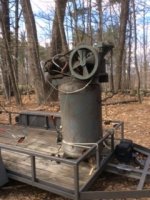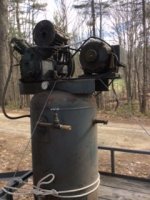Offline
This is a followup to my previous post on air compressor size.
https://www.britishcarforum.com/bcf/showthread.php?105123-Air-Compressors-how-much-is-too-much
I have no idea how this will work out but it was not costly, I like old machines, and it runs so quietly that the seller and I carried out a conversation without difficulty standing no more than 3 feet away from it while it was running.
It has a very large Century Electric motor rated at 21 amps at 220 volts (single phase) although it is rated as 3HP, which is kind of a mystery. As you can see, the motor is huge.
The Compressor appears to be a two stage but the tag is missing. It looks like the compressors made or used by by Ingersoll Rand of the same vintage. The Wood Industrial Co. tank is dated 1971 but is a different color than the motor. It could have been replaced or more likely the pump rebuilt and re-painted at some point. Most likely, Wood Industrial made the unit.
I plan, initially at least, to plug it in and see how it goes. Sorry, phone pictures are not very good.


https://www.britishcarforum.com/bcf/showthread.php?105123-Air-Compressors-how-much-is-too-much
I have no idea how this will work out but it was not costly, I like old machines, and it runs so quietly that the seller and I carried out a conversation without difficulty standing no more than 3 feet away from it while it was running.
It has a very large Century Electric motor rated at 21 amps at 220 volts (single phase) although it is rated as 3HP, which is kind of a mystery. As you can see, the motor is huge.
The Compressor appears to be a two stage but the tag is missing. It looks like the compressors made or used by by Ingersoll Rand of the same vintage. The Wood Industrial Co. tank is dated 1971 but is a different color than the motor. It could have been replaced or more likely the pump rebuilt and re-painted at some point. Most likely, Wood Industrial made the unit.
I plan, initially at least, to plug it in and see how it goes. Sorry, phone pictures are not very good.



 Hi Guest!
Hi Guest!

 smilie in place of the real @
smilie in place of the real @
 Pretty Please - add it to our Events forum(s) and add to the calendar! >>
Pretty Please - add it to our Events forum(s) and add to the calendar! >> 
